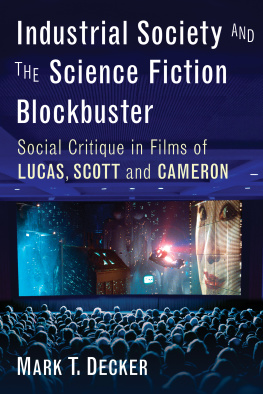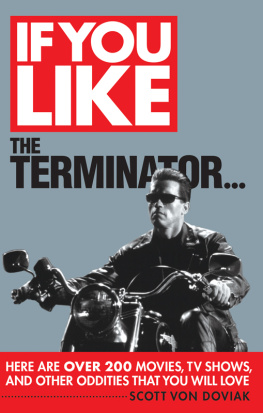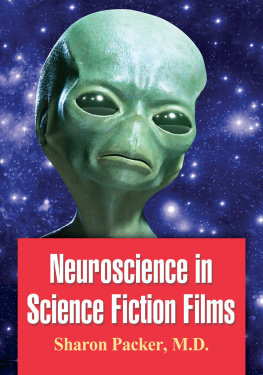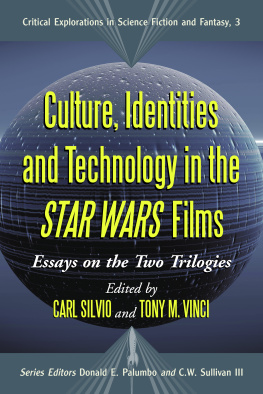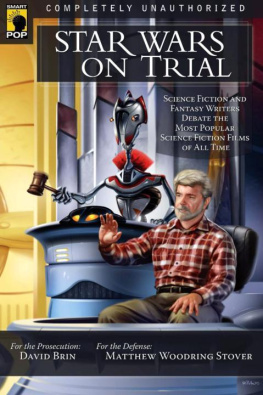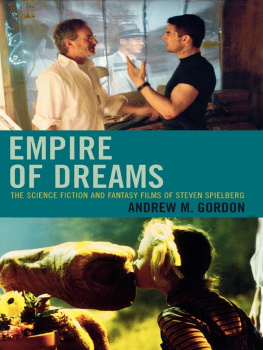
Industrial Society and the Science Fiction Blockbuster
Social Critique in Films of Lucas, Scott and Cameron
Mark T. Decker
McFarland & Company, Inc., Publishers
Jefferson, North Carolina
LIBRARY OF CONGRESS CATALOGUING DATA ARE AVAILABLE
BRITISH LIBRARY CATALOGUING DATA ARE AVAILABLE
e-ISBN: 978-1-4766-2387-0
2016 Mark T. Decker. All rights reserved
No part of this book may be reproduced or transmitted in any form or by any means, electronic or mechanical, including photocopying or recording, or by any information storage and retrieval system, without permission in writing from the publisher.
Front cover: (on screen) Scene from the 1982 Ridley Scott film Blade Runner (Warner Bros./Photofest); theater 2016 Photoncatcher/iStock
McFarland & Company, Inc., Publishers
Box 611, Jefferson, North Carolina 28640
www.mcfarlandpub.com
Acknowledgments
Many acknowledgments begin by stating that many people have helped the author during the process of writing the book; mine will be no different. I would like to give a special thanks to Mike Levy, who first encouraged me to begin the academic study of science fiction. I would also like to thank Patrick Murphy, who gave me invaluable insight into the connection between graphic novels and blockbuster science fiction films.
Many of the arguments addressed here were first worked out in papers presented at meetings of the Science Fiction Research Association and the International Conference on the Fantastic in the Arts. Chapter 3 is a lightly revised version of an article that appeared in Extrapolation in 2009. I would like to thank Liverpool University Press for granting permission to reprint it here.
This book was largely written during a sabbatical granted by Bloomsburg University and funded by the Pennsylvania State System of Higher Education. During that sabbatical, office space was provided by my friend Todd Moinier; I could not have written as much as I did in such a relatively short time without his help.
I would also like to thank my wife Gayle and my childrenGrace, Mary, Max, Caroline, and Rosefor supporting my efforts.
Preface
Blockbuster films have been a fixture of summersand increasingly Christmasscommercial landscape for over four decades now. At least since Stephen Spielbergs Jaws (1975), action-oriented, widely released, and heavily marketed films that are seen by a significant proportion of the population come as reliably with warm weather as low interest rates, rebates on new automobiles, and Memorial Day sales at department stores. And while it would be difficult to argue that Jaws is best described as science fiction, some of the most commercially successful blockbusters have been science fiction films. Indeed, George Lucas Star Wars (it was not widely known as A New Hope in 1977) solidified the blockbusters hold on the season when it arrived in theaters two years after Jaws and James Camerons Avatar (2009) firmly placed the science fiction blockbuster on Christmas commercial calendar over three decades later.
Because blockbusters are the heavily financed products of wealthy corporations that expect a healthy return on their investments, it is fair to compare these films to the new cars that dealers strive to move off their lots in late summer, the new seasons clothes that department stores are using to lure customers, or even the Christmas lights that hardware stores use to help their bottom line during what, for them, is a slow time of year. The aptness of this comparison is even clearer when we consider that blockbusters are sometimes little more than mindless entertainment, pleasing most audience members but leaving reviewers cold, and giving academic critics a convenient reference point for their discussions of societys myopic conceptualizations of itself.
Yet perhaps it is too easy to dismiss all blockbusters as nothing more than slick product from a multi-billion-dollar, multinational entertainment industry. Given the cultural penetration of blockbusters, if they did incorporate social critique into their themes, they could reach people who would never dream of listening to or reading an academic or public intellectual discuss societys ills. Consequently, if such films actually did contain a cogent and rhetorically powerful critique of society, some blockbusters could be a powerful conduit for delivering popularized versions of serious cultural critique to a broad audience. Because of their speculative nature, science fiction blockbusters would be particularly well suited to this task.
This book describes just such an act of cultural transmission. In the late 1960s and early 1970s, a professor named Herbert Marcuse argued that industrial society, in both its capitalist and communist forms, was estranging people from the environment, from their own desires, and from the people they loved by creating false needs for material goods. Marcuse found this situation particular reprehensible because technology could be used to free people from drudgery and create a more just society, and he was able to make this argument in bestselling books, national magazines, and in television interviews. Concepts like one-dimensional thought, false needs, and the ability of a broadly-considered Eros to help build a more just society resonated with contemporary audiences. Because of the philosophers broader exposure, arguments that may have lived and died in classrooms and little-read scholarly books entered the zeitgeist. Not only did Marcuse become the darling of the counterculture, but his influence among the broader public drew the ire of no less a figure than Ronald Reagan, then Governor of California. And because Marcuses ideas, or at least popularized versions of them, broke free of the academy and into popular culture, they found their way into the work of the three directors who are probably most responsible for establish the science fiction blockbuster in our cultural psyche. Extremely profitable films like 1979s Alien, 1984s Return of the Jedi, and 1991s Terminator 2 not only entertained fans and (admittedly) enriched investors, but they also reconfigured a cultural critique that had been instrumental in the protests of the 1960s, giving it a pop-cultural half-life that extends its viability into the new century.
This book will argue that Marcuses theories were incorporated into a critical and oppositional zeitgeist that heavily influenced blockbuster science fiction films by George Lucas, Ridley Scott, and James Cameron. This influence will be delineated by a careful reading of Marcuses theories and a reconstruction of his place in popular culture during the height of his influence. Then, close readings of Lucas, Scotts, and Camerons films, as well as the filmmakers own comments and relevant secondary sources, will reveal how their movies employ lines of argument about how the powerful often use technology to pacify rather than improve society. These readings, in turn, will demonstrate that blockbuster film can transmit serious social critique.
My interest in this topic stems from a longstanding desire to investigate the ability of popular culture to function as a means of cultural critique. In graduate school, studying canonical American literature, I read with great interest, and a healthy dose of skepticism, the contentions of mid20th-century intellectuals like Dwight MacDonald that middlebrow culture dulled peoples ability to think for themselves and turned them into conformists. Later, as a new assistant professor, I began to study science fiction film seriously. I noticed that there were some dismissive readings of blockbusters like Lucas
Next page
